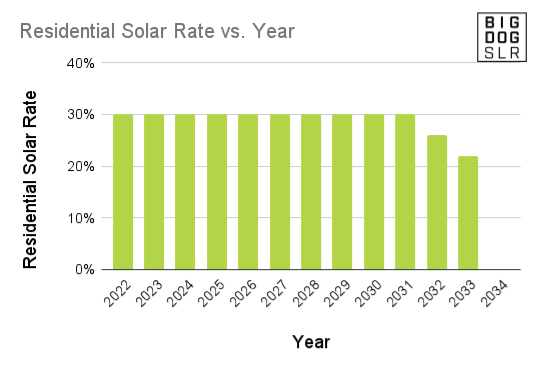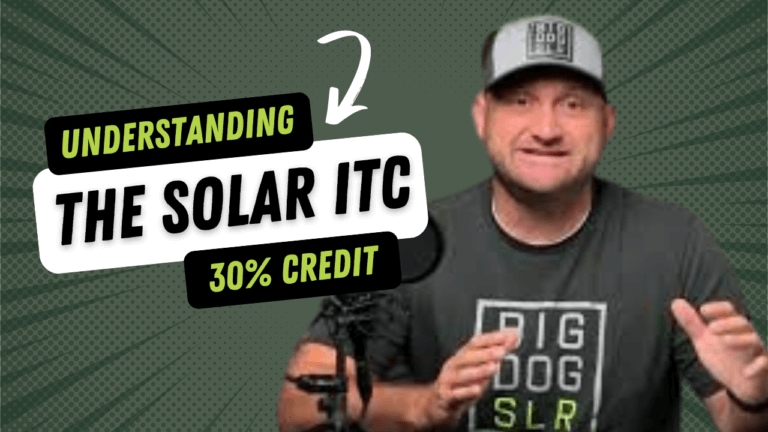Understanding the Solar Investment Tax Credit
"In this world, nothing is certain except death and taxes." wrote Ben Franklin in a 1789 letter. None of us can avoid death, but at least there are some ways we can reduce our taxes. The Solar Investment Tax Credit allows you to do just that!
The Federal Solar Tax Credit provides a 30% tax credit for solar energy systems installed between 2017-2032. During 2032 they will drop to 26%. Systems installed in 2033 will receive a 22% tax credit. Unless renewed by congress, this tax credit will expire entirely for residential systems installed in 2034.

Table of Contents
Is the solar tax credit a discount on solar panel installation?
No, although it is a saving on taxes. After discussing this with a certified tax professional you might learn that all or part of your solar energy system is eligible for this 30% tax credit.
What does this mean for you? If the system costs $10,000, the tax credit will come into effect when it's time to pay income taxes. This means that up to 30% of that $10,000 cost will be directly discounted from your taxes.
In this case, it would be a savings of $3,000 from your income taxes.
To find out more, talk to a tax professional, and a solar installation professional to learn more about the costs of a system, and potential tax savings. There are many factors that will influence these amounts in each case.
Solar Tax Credit vs Tax Deduction: What you need to know

For residential customers, the federal solar investment tax credit is accounted for in a person's income taxes.
The solar investment tax credit can be highly lucrative. It's important to note that it functions differently from a tax deduction.
A tax credit is a dollar-for-dollar amount that is removed from the final amount of taxes that you need to pay. A deduction is an amount that doesn't have to be counted as part of your income taxes.
A tax credit is almost like an IRS gift card. It's equal to an exact amount of money, but can only be claimed with the IRS. It is NOT going to be paid out to you in a tax refund. It's a credit you can put against your tax costs for a direct discount.

There is a significant difference in the savings from a tax credit and the savings from a tax deduction. This chart demonstrates the difference between the real savings between a tax credit and a tax deduction at a different amount.
The green bars represent tax credit savings and the gray bars represent tax deduction savings. The credits and deductions range from $1,000 to $5,000 in increments of $1,000.
As you can see, a tax credit results in a much greater discount on taxes than a tax deduction does. A deduction just changes the income being taxed, whereas a tax credit is a direct tax discount. A $5,000 tax credit results in a $5,000 discount on taxes. A $5,000 deduction for our fictional homeowner making $75,000/year only results in a $1,100 reduction in taxes owed!
This chart is just a basic example. Home and business owners can only know their tax savings after filing taxes and consulting with a certified tax professional that's familiar with these laws.
Am I eligible to receive solar tax credits?
You could be eligible if you meet the following criteria:
- If the Solar Panels have been installed before December 31, 2034.
- The solar PV system must be located on your residential or commercial property.
- You or your business must own the solar PV system, or you must have purchased an interest in an off-site community solar project. The electricity generated by the project must be credited against, and not exceed, the home's electricity consumption.
- The solar PV system must be new or have never been used before. Furthermore, you can only claim the credit on the original installation of the PV system
What if the whole tax credit can't be redeemed in one year?
The solar investment tax credit can end up being a large sum. If your solar system cost $20,000 then your tax credit amount would likely be $6,000. Many homeowners wouldn't have that much tax liability in a year.
Some people let this stop them from going solar, but the beautiful thing about the tax credit is that it can be rolled over from year to year.
This applies even if you didn't have any tax liability in the first year that you got solar. Unfortunately, the solar ITC isn't a rebate. Money won't be given back to a homeowner from the federal government, but with the year-over-year rollover of unused credit amount, you can always claim the full tax credit.
Has the solar tax credit been extended?
On December 27th, 2020, and then on August 12th, 2022 two separate acts were passed that allowed the solar investment tax credit to be extended. The first was a Covid relief package and the second is known as the inflation reduction act.
This in part, allowed for an extension of the ITC or the Solar Investment Tax Credit. This relief package delayed the phasedown of federal solar tax credits by a decade!
This leaves the tax credit for residential solar at 30% until 2032. On January 1st of 2032, it will drop to 26%. On January 1st of 2033, it's scheduled to drop to 22%. On January 1st of 2034, it will expire completely. This means no more tax credits.
Is there a limit to the federal solar tax credit?
The federal solar tax credit is based on a system of percentages. As mentioned previously, the current amount is 30%.
According to this energy.gov article on the solar tax credit, "There is no maximum amount that can be claimed." This means that if a system costs $10,000, then 30% of that, or $3,000 will be offered as a tax credit. If a system costs more than that, the amount of tax savings can go up in proportion to the amount spent on the solar energy system.
How do I get the solar investment tax credit(ITC)?
Simple. Download our easy-to-read 1,339-page guide.
Just kidding! It's not that bad. The solar tax credit can only be received after the installation of a solar energy system takes place and taxes are filed. To get it:
- Get a system estimate from a solar energy expert.
- Consult with a licensed tax professional on the tax benefits you are eligible for.
- Have the system installed up to code.
- File IRS form 5695 as part of your tax return.
We've been installing solar energy systems since 2008. Since then we've completed over 10,000 solar jobs. As you investigate solar, feel free to reach out with questions you might have. Check out our other articles, and our YouTube channel. There we offer loads of resources to address the most common questions and concerns related to solar. You can also meet with one of our solar consultants to learn more about the benefits solar can have for your home or business. They'll go through an energy audit, home analysis, system design, and more to create a tailored quote.
Would I still be eligible if...
Yes. Not being a homeowner would not disqualify you from claiming the solar tax credit as long as you are the owner of the PV system or contribute to the cost of the system.
I installed solar on my vacation home.
Installing a solar PV system on a vacation home in the United States would make you eligible for the credit as long as as the property is used as a primary residence or as an income-producing property. If it is for a rental unit you own, you may be eligible for business ITC.
Yes. You don’t have to be connected to the grid as long as your solar PV system is generating electricity for your residence.
My solar panels aren't installed on my roof.
Yes. It doesn’t matter so much as to where the solar panels are installed as long as they are on your property and generate electricity for your residence.
My business is located in the same building.
Yes. However, claiming tax credits may be more complicated if your residence also serves as a business or home office. It is important to note that if less than 80% of the system cost is considered a residential expense, only that percentage can be used to calculate the credit. The portion of the cost that is a business expense may be eligible for a similar commercial ITC on the business’s tax return.
Yes. supposing the system was financed through the seller and is required to pay the full amount of the system, you can claim the Federal Solar Credit based on the full cost of the system. Only the cost of the solar PV system itself is eligible for credit. Certain expenses can’t be included in your tax credit such as interest on financing, original fees, and extended warranty.
I bought solar panels, but they aren't installed yet.
No. The panels must be installed to be eligible for credit.
I bought a house but didn't move in until the following year.
Yes. Generally, if it has already come installed you can claim a tax credit for the PV solar expenses the year you move in. Note that you must contact the builder to verify if the tax credit was already claimed.
FAQ
Can my tax credit go towards the cost of a new roof?
No, it’s considered “nonrefundable”, meaning it can only be used to offset your tax liability for that year. However, any unused portion of the credit can be carried forward to future tax years, until the credit is fully used.
Will the solar ITC still work with the minimum tax?
Yes. You can use the tax credit against either the federal income tax or the alternative minimum tax.
How do other incentives I receive affect the federal tax credit?
It wouldn’t. Any state or local incentives would be an addition to the federal tax credit.
Visit this Idaho page or Colorado page for more information on other incentives.
Installation and operation of the system. SOme of the expenses that may be included in the credit are:
- The cost of solar panels or PV cells
- Any labor costs from contractors including permitting fees, inspection costs, developer fees, and installation costs.
- Solar equipment such as inverters, writing, and mounting hardware.
- Solar battery storage device.
- Sales taxes.
Helpful Resources
There are tons of places where you can find more detailed information. Here are a few to start you off:
- Homeowner's Guide to The Tax Credit
- Whitehouse Fact Sheet on the Inflation Reduction Act
- Fact Sheet on Solar ITC Initiatives
- IRS Form 5695

Find your solar score in 5 minutes.
You may be more well suited than you think. Get your solar readiness score.







.webp)








